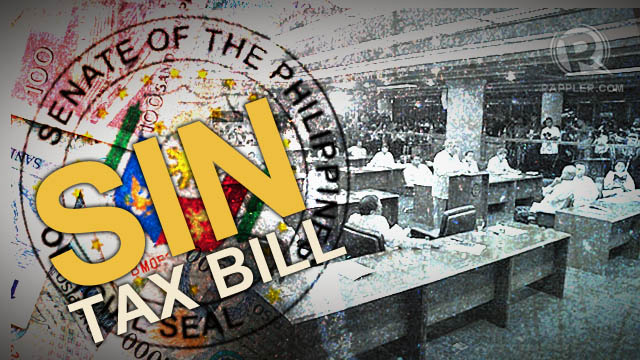SUMMARY
This is AI generated summarization, which may have errors. For context, always refer to the full article.

(Editor’s Note: This is last of a 4-part special report on sin taxes.)
MANILA, Philippines – The controversial sin tax bill – one of only two pieces of revenue legislations the Aquino administration pursued keenly – hangs in the balance.
The bill, which seeks to increase excise taxes on tobacco and alcohol products, faces uncertainty in two areas: its timely passage and the amount of revenue it should raise.
If the Palace therefore wants the bill – and the version it desires – passed, then President Benigno Aquino III must flex his political muscle well.
An ally of Aquino, Cavite Rep. and now Transportation Secretary Joseph Emilio Abaya said the President has to make “phone calls” to counter tobacco and alcohol industry lobby.
“This is a historic moment. We’ve never gone this far before, so dapat hindi masayang (Our efforts should not be wasted),” Abaya earlier told Rappler. Abaya is the author of the original sin tax version filed in the House that seeks P60 billion additional revenue and has a counterpart bill in the Senate filed by Senator Miriam Defensor Santiago.
Abaya said a version that will essentially maintain or worsen the current excise tax system is not an option. “The President knows. We’ve gone this far. This requires phone calls from him.”
President Aquino had been consistent in sharing his confidence that the measure will be passed even before senators seek reelection in the 2013 polls.
“There are several senators who are opting to run for next year’s elections …. So do we need a plan B if in [case] it doesn’t pass? I think I am confident that it will pass,” Aquino said.
From P60-billion to P15-billion
From the P60-billion Abaya version, the sin tax bill has gone to a House-approved one that halved the target revenue to P31 billion, then to a Senate committee report that halved it again to P15 billion.
This Senate report, meantime, is threatened to be withdrawn – an issue that has become a drag on the legislative process. The Senate committee on ways and means has yet to decide whether it will give in to Senator Ralph Recto, who, after drawing flak for the “watered-down” report, resigned as committee chair and demanded to be allowed to withdraw his report.
Starting from scratch and crafting a new report will take time, Senate President Juan Ponce Enrile has said. However, it will give the new Senate committee leadership, led by Recto’s successor Senator Franklin Drilon, who, by the way, is supportive of the Palace’s version, leeway to set the direction of the bill.
Senators Drilon, Santiago and Pia Cayetano were among those who expressed misgivings on the Recto report. They vowed to fight for a better version.
House or Santiago bill
The decision on Recto’s report will be known when Congress resumes sessions in the week of November 5 after a two-week break.
Will the Senate ways and means committee retain it or scrap it?
If they choose to retain it, Drilon said plenary debates on the bill may proceed. “Withdrawing the report will need the approval of the committee members or the plenary. We can retain it because it was submitted already so we can proceed with the debates.”
Recto expressed strong objections to this, however. “If my report is so bad, why are you going to use it?” he asked. “I wrote it. Let them write theirs. It is the product of my own mind. I labored two weeks to write this. This is my intellectual property.”
The Recto report endorsing Senate Bill (SB) 3299 seeks to impose a 3-tier tax system for tobacco – to be downgraded to 2 only by 2020 – against the 2-tier under the House-approved bill No. 5727. SB 3299 proposes as low as P6 and as high as P16 tax rates for cigarettes, much lower than the P22 and P28.30 under HB 5727.
Instead of an 8% increase in tax rates every 2 years from 2015 until 2025 under HB 5727, Recto’s version provided for a fixed increase of P1.50 every 2 years, starting 2015 until 2020.
The Recto version also collapsed the current premium- and high-priced cigarette brands into one tier – which means premium brands will now be taxed P14 per pack on the first year, down by half from the current P28.30.
Recto, who maintained his version was the “realistic, reasonable and responsible” one, suggested that the Senate committee adopt the House version or the one filed by Santiago.
Santiago, who called Recto’s report “an abject surrender to the very powerful tobacco and alcohol lobby,” is the principal author of SB 3249, which carries the same provisions as the original P60-billion version.
Stong opposition
The P60-billion version of the sin tax bill was, however, earlier met with strong opposition from several senators, who echoed the concerns cited by the tobacco and alcohol industry – that the bill is unfair; it will displace tobacco farmers; and may reduce the tax revenue currently generated by government.
Recto said if the bill would indeed reduce consumption of sin products by imposing significantly high taxes, which is its main goal, taxes collected from these products might go down, too.
Recto and Enrile also earlier raised the issue of equitability. Recto said: “Why do we place the same tax on a Johnny Walker Black and a Ginebra San Miguel? Bigger companies should have bigger burdens.”
Enrile suggested that instead of setting a uniform, specific tax rate, the government should shift to ad valorem taxation, where products are taxed based on their value. “Why don’t we return to an ad valorem tax? Isn’t that more equitable?”
Senator Ferdinand “Bongbong” Marcos, meanwhile, expressed worry that the bill would put tobacco farmers out of work.
“Ang mangyayari diyan ay magkakaroon ng displacement ’yong ating mga tobacco farmers. Iyong ating mga growers at retailers, pati mga traders. Lahat sila mararamdaman nila ang pagbawas ng konsumo ng tobacco,” Marcos said. (Tobacco farmers will be displaced. Even retailers and traders, they will feel the effects of the reduction in consumption.)
Finance officials and tobacco control advocates have counter-arguments, too.
One, they said, lower consumption will not result in lower revenues for government because revenue gains from the high tax rates will more than offset losses from the reduction in consumption.
Two, and on Enrile’s suggestion to revert to an ad valorem tax system, officials brought up the issue of administration: “The same bottle of beer will be sold anywhere from P35-P100 in different sari-sari stores, groceries… How do we determine the excise taxes if we don’t know their exact retail prices?” asked Bureau of Internal Revenue Commissioner (BIR) Kim Henares.
Three, tobacco farmers will be taken care of as a provision under the bill allocates a portion of incremental revenues to support their shift to viable alternative crops. In fact, officials said farmers themselves have been calling on the government for help, citing high production costs and labor requirements in growing tobacco.
Data from the Bureau of Agricultural Statistics in 2007 showed that other crops such as corn and tomato were more profitable than tobacco. A hectare of corn field raked in P59,275 per hectare that year, while tobacco turned in only P22,148. Tomato earned P50,380 per hectare.
New revenue floor
While they debunked the industry concerns, finance officials said they are still open to a compromise.
They floated a “new revenue floor” of P40 billion in a closed-door caucus with Senators before sessions were suspended in October.
“We will stick to the P60 billion, but what we want is not what we always get. P40 billion is the minimum,” Finance Secretary Cesar Purisima told reporters after the caucus. “It is a number that will allow us to attain our objectives of financing health care and discouraging the use of sin products.”
“But [we will be able to attain our objectives] longer with P40 billion. P60 billion will allow us to attain these faster,” added Henares.
Under the original plan, 85% of additional revenue from the sin tax bill will be used to finance the Aquino government’s universal health care program, which primarily aims to provide the poorest families with health insurance. The rest of the revenue will be used to assist tobacco farmers in shifting to other crops.
Time constraints
If P60 billion is too high, will P40 billion get enough votes in the Senate then? “I am not sure of the numbers,” Enrile was earlier quoted by a newspaper report as saying.
He said the one who studied the sin tax bill well was Recto.
“I don’t know how they (finance officials) did it (P40 billion), what model they used,” he added.
And if Drilon adopts the “new revenue floor” given by the Palace in a new committee report, “he will have to construct his own tax model” because “he will be asked where he got the figure,” noted Enrile.
This will create another constraint in the target to pass the bill by mid-November before plenary debates on another important measure – the P2-trillion national budget for 2013 – start.
After the hullabaloo caused by Recto’s resignation, Drilon said the latest the Senate may be able to pass the bill is January. “We will try to get it in November, but if not, we have no choice.”
There were concerns that if not passed this year, the sin tax bill may be put off for another year as legislators shift their focus to campaigning for the mid-term 2013 polls.
But the President thinks the polls will not get in the way. “There are several senators who are opting to run for next year’s elections… And how can anybody say they are opposed to an effective sin tax measure? So do we need a plan B if it doesn’t pass? I think I am confident that it will pass,” Aquino said.
Vital to credit ratings
The sin tax bill is the only revenue measure that the Aquino administration has certified urgent so far in its term. Another measure, the rationalization of fiscal incentives, is also a priority, but it has taken a back seat to the sin tax.
Aquino, who won on an anti-corruption platform in 2010, promised no new taxes in its drive to shore up much-needed government revenues that will finance the country’s budget deficit and fund vital social services programs. Instead, he vowed to plug the leakage in the tax system by going after tax cheats and smugglers, and reforming current tax laws that have weighed on national coffers such as the sin tax.
More than a seal of good housekeeping, the sin tax is a key consideration to a major government goal that, if attained, would be unprecedented – the Philippines’ first investment grade status.
Credit ratings agencies such as Moody’s, Fitch Ratings and Standard & Poor’s are awaiting the passage of the bill, which they said would give the Philippines a revenue boost that will allow it to finally catch up with its regional peers.
All 3 credit ratings agencies now rate the country a notch below investment grade.
Officials declared, however, that the sin tax bill is no longer just a revenue measure.
“It is a health measure,” said Health Secretary Enrique Ona, who warned the tobacco industry of “tougher” measures if it fights the bill.
Various international studies by tobacco control advocates showed that aside from higher excise taxes, another measure that the tobacco industry fears most is plain packaging because it removes their advertising advantage. – Rappler.com
Part 3: Lower sin tax, less health care for poor
Part 2: Taxing tobacco: ‘Gov’t still earns if poor, youth buy less’
Part 1: Higher cigarette taxes: A promise compromised?
More on the Sin tax bill:
- Palace banks on sin tax bill for hospital upgrades
- Drilon’s ‘weight loss’ plan? Sin tax, budget by year-end
- Lower sin tax, less health care for poor
- BISYO: A special report on Sin Tax
- Vitug Vlogs: Aquino’s ratings and the sin tax bill
- ‘Revenues from sin tax bill to contain 2013 PH deficit’
- Half of Pinoy smokers likely to quit if sin taxes increase – survey
Add a comment
How does this make you feel?



![[Ilonggo Notes] The foremost Filipino engraver, sadly unremembered, needs to be given his due](https://www.rappler.com/tachyon/2024/03/Figueroa-.jpg?resize=257%2C257&crop=265px%2C0px%2C720px%2C720px)

There are no comments yet. Add your comment to start the conversation.